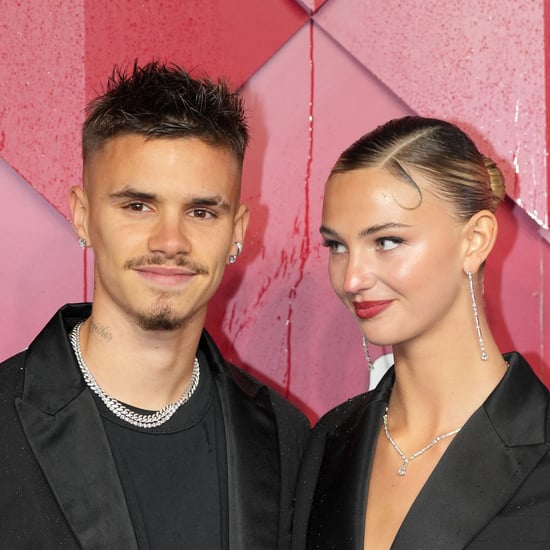Why Can't We Stop Speculating About Celebrities' Sexuality?
Making Assumptions About Celebrities' Sexual Identities Just Doesn't Work Anymore. Here's Why.

After a hiatus from Twitter, "Heartstopper" star Kit Connor woke up and felt pressured to tweet, "back for a minute. i'm bi. congrats for forcing an 18 year old to out himself. i think some of you missed the point of the show. bye." After months of harassment over not labelling his sexual identity, the lead of Netflix's teen drama series said he felt obligated to succumb to public pressure.
But he's not alone in this recent push for celebrities to take on a label. Harry Styles, Joshua Bassett, Bad Bunny, and Taylor Swift (aka #Gaylor) have all faced recent scrutiny over whether or not they're "queerbaiting" their fans. Queerbaiting is a relatively recent term because being queer historically wasn't something corporate America could capitalize off of because . . . well, homophobia. Now, pushing gender norms and embracing sexual fluidity generates social meaning and significance.
So why are we so fixated on celebrities "proving" their sexuality? For one, the strong desire for accurate representation has been long overdue. Also, after years of being perpetually online, we've developed parasocial relationships with these celebrities. We want to relate to them. And the thought of their queerness not being "real" feels like being lied to — it's a betrayal.
Many of those who have traditionally felt isolated — like queer youth — may form a stronger attachment to their favourite celebrities in order to understand their own identities better. Recent studies have emphasised the influential role LGBTQ+ media figures have in helping to develop the identity of LGBTQ+ individuals, and understanding our identity is a fundamental psychological need. As a closeted queer kid, watching shows and movies with queer storylines was rare but appreciated; it gave me a sense of community, which helped shape my identity. Representation works hand in hand with validation.
So, we want authenticity — but at what cost? We've become so worried about whether or not a public figure is queerbaiting that we risk cutting short their own journey of self-discovery. Connor is an example of what goes wrong when we expect anybody, regardless of celebrity status, to "come out" to appease the masses.
Somewhere along the way, some of us forgot that the original definition of queerbaiting was meant to describe Hollywood's vague use of queer storylines to bait viewers from the LGBTQ+ community to watch their shows. Or, as one Twitter user described it, "I feel like 'queer baiting' should only be used in the context of a corporation/show/creation pulling viewers in by alluding to lgbtq representation but then never fully going there so as not to alienate homophobic viewers." "Rainbow capitalism" is another example. The term became widely used to describe companies suddenly interested in advertising at the 50th Anniversary of Stonewall or launching rainbow-coloured merch without necessarily donating a significant portion of their profits to LGBTQ+ causes or even ensuring their workplaces are a safe or accessible space for queer workers. These corporate examples of queerbaiting deserve to be called out, questioned, and examined.
We've become so worried about whether or not a public figure is queerbaiting that we risk cutting short their own journey of self-discovery.
But when it comes to an individual — say, an 18-year-old teen starring in a show that centres on a queer love story — why are we so obsessed with finding the "truth" of this person's sexuality? We're essentially asking people the archaic "What team do you bat for?" question. The irony is how heteronormative it is to expect someone to firmly fit in a predetermined box. I'm guilty of it myself, of scrounging for any evidence of queerness in my favourite characters and the actors who play them. It's damageing to force someone to "come out" before they're ready for so many reasons, least of which is that sexuality is deeply personal and sharing it without consent can lead to lasting trauma.
"We wish that people would stop assuming cis/straight identities so that the onus of 'coming out' wouldn't be placed solely on queer folks," Lena Peak, an educator for LGBTQ+ counseling and therapy organisation The Expansive Group, posted on Instagram for Coming Out Day. "One way we can begin to reimagine 'coming out' is by viewing it as a process letting people in (rather than a grand, one-time announcement)." So while, yes, celebrities have the responsibility of a platform, it doesn't mean they don't deserve just as much space and time before sharing it with the world.
Audiences seek media content and figures consistent with their identity and values. But that shouldn't equate to forcing someone to "come out" before they're ready to in order to satisfy someone else's needs or curiosity. There's also a difference between, for instance, actor Eddie Redmayne playing a trans woman in "The Danish Girl" and what happened to Connor. Redmayne is a known cis actor playing trans, which reinforces a harmful trope that a trans woman's identity is "nothing more than a costume which, when removed, reveals a man beneath," as Pink News writes. It's also worth questioning whether this casting is a way to allow a production company to profit off a trans story, without giving an opportunity to a trans actor. (But there's a whole separate conversation to be had about straight and/or cis actors playing LGBTQ+ roles.)
Connor, on the other hand, is a young person who's literally playing a teenager who's still learning about his sexuality. He had never publicly confirmed or labeled his sexual identity, and many of the accusations of queerbaiting arose based on a video, which allegedly showed Connor holding hands with a young woman, according to Autostraddle.
We need to work on gaining a more nuanced understanding of the association between queerbaiting for the sake of corporate greed and the expectations we place on our favourite celebrity. Also, frankly, accusations of queerbaiting are often biphobic. With Connor, Styles, Bassett, Bunny, and Swift, we validate someone's queerness only if they have publicly dated a same-sex partner, completely disregarding the entire understanding of sexual fluidity or how your partner's gender orientation doesn't equate to your sexuality. Lili Reinhart told Flaunt Magazine, "I felt that since I've exclusively been in hetero-normative relationships, it would be too easy for any outsider, especially the media, to vilify me and accuse me of faking it to get attention." And she wasn't wrong. After coming out as bisexual on her Instagram story, biphobic comments littered her account (often posted by others in the LGBTQ+ community).
Part of this problem is that there is still a lack of true and realistic representation of LGBTQ+ characters in the media. But the "discourse" around queerbaiting has pivoted from anger at the capitalist machine that churns out half-baked queer characters — and too few of them, at that — to pressuring individuals to subscribe to a specific label. And for that reason, as influencer Matt Bernstein writes in his reply to Connor's tweet: "death to 'queerbaiting' discourse forever." The pressure should be put on systems, and not on specific people like Connor.
Unfortunately, LGBTQ+ culture and history have only recently risen to the public interest. And the opportunity to have queer people tell queer stories is crucial! But putting pressure on others to "come out" to prove their queerness is not OK. As Peak writes, "Coming out is never a one-time event; it's a continuous journey of letting people in. You get to decide if, when, and how you want to let people in." But unfortunately for Connor, he felt it wasn't his decision. Hopefully something we can all learn from moving forward.






